Cora
had a story to tell, yet it had been
locked up in her memories for many
years, as when it had happened when she
was twelve years old, living with her
grandparents, John M. and Selena (Beal)
McFarland.
Cora had been born in Montville, Me. in
1866, the daughter of Henry C. and
Abigail (Bailey) McFarland. Cora
remembered her father, and that
sometimes he could be withdrawn and
quiet, keeping to himself. Yet, he was a
kind and loving father.
One Sunday morning when she was eight
years of age, Henry told Abbie, Cora and
his parents to go on to church without
him, as he had some work to do. The
family attended the North Montville
Meeting House. Henry had a sister,
Eliza, who had married Hollis T. Gowin.
Eliza had died four years previously
from complications of childbirth. She
was thirty-six years old. Henry had been
depressed, among other things, at the
loss of his sister and her baby.
When the family returned from church,
Henry could not be found. The neighbors
came out to aid in the search for him.
They found thirty-three year-old Henry
in the meadow behind the farm buildings,
where he had tied his feet together, and
drowned in six inches of water.
Cora and her mother, Abbie, lived on
with his parents in North Montville,
about three miles from Freedom, near
Halldale. The old farm house was on one
side of the road, while the barn was
across the road.
When Cora was ten years old, her mother,
Abigail, married a big robust man by the
name of George W. Rowell, who came to
live in Grampa and Gramma McFarland’s
home. George had spent seventeen years
in California, allegedly amassing some
money for himself. He had returned to
his hometown of Montville. He, at first,
helped with the farm work, being quite
affable. The next February, George and
Abbie had a baby daughter, whom they
named Alice. Alice was a joy in the
household. Cora willingly tended her
baby sister, who was a happy child, and
making the days cheery, even for her
grandparents.
But, even young Cora noticed a
difference in George. He paid a lot of
attention to both Cora and baby Alice.
It was attention that made Cora
uncomfortable at times, and was noticed
by her grandparents.
George spent a lot of time away from
home, and when he was home, he was
sullen, moody and even threatening at
times. He often smelled of alcohol,
which was offensive to Cora, as her
grandparents, and her father did not
drink alcoholic beverages. Cora had been
taught at church about the evils of
alcohol. Cora could sense tenseness in
the household, but nothing prepared her
for what finally happened.
Cora grew up, attending Freedom Academy.
She married Charlie Vose, a very gentle
man in Knox, Me. Though they had no
children of their own, they adopted a
son, named after her father, Henry.
Charlie owned a very large farm in Knox
on the Hoxie Road, where they lived a
peaceful life, though the work was hard.
They had a small herd of cows, a flock
of chickens, some sheep and
annually raised a hog or two for the
meat, lard and salt pork.
Charlie was a prosperous farmer and a
highly respected citizen of Knox, Me.
where he had spent his entire life. He
had been a teacher, supervisor of the
schools, and had served as Treasurer and
Town Clerk of the Town of Knox. When
Charlie was twenty-two years old, before
he married Cora, he was converted to a
belief in Jesus Christ as Savior in a
revival by Rev. James Washburn at the
North Montville Meeting house. He was
one of twenty-four converts who were
baptized on July 3, 1887, and who joined
the Free Will Baptist Church in North
Montville. Charlie and Cora were always
active members in the church and
community. Charlie died in Dec. 1910,
being attended by Dr. C. M.Whitney,
having a lung affliction. He was
forty-three years of age.
Cora continued on the farm, hiring help
and having boarders to help with farm
chores, haying, gardening and all that
goes with running a farm. She lived as a
widow for twelve years. Each spring,
Cora hired help to ‘press’ hay in the
barn, done with an invention called a
‘hay press’. For several years she had
hired John W. Morse of Belmont, Me. to
bring his ‘hay press’ to her farm. John
came with his crew, which included his
young son, Amon Morse, and his
son-in-law, Jephtha Buck.
While the crew was working at the farm,
Cora boarded and fed them. Her large
open chamber long ago became a
bunk-house to put up workers. One
evening after supper, Amon asked Cora
about where she had been born and
raised. Cora told of events in her life,
her father’s suicide when she was young,
and how, at age twelve, she had been
present when her grandparents were
murdered. She had been a witness at the
informal inquest as to the events that
happened on the cold snowy night about 7
p.m. on Saturday, Jan. 25, 1879.
Amon was totally mesmerized as Cora
related the following story. Her
step-father, George Rowell, had been
away for some time. George told the
family that he’d been in Belfast for a
bottle of rum for his cold. He was seen
driving his horse at a break-neck speed.
When he arrived in Belfast, the horse
was over-heated with foam at its mouth
from the trip. George had spent three
nights in Belfast, two nights of which
were spent at a relative‘s home,
returning home on Friday. Grampa and
Gramma were very concerned. That night,
Grampa had asked neighbor, Alonzo
Raynes, to stay the night with them.
Mr. Raynes left in the morning, sending
his young hired hand, Fred Bennett, back
to the McFarland home to spent the day
and night. The family was growing
increasingly afraid of George. When
evening came, he was difficult and
surly, saying that he wanted his little
girl, Cora, and his “angel baby” Alice
in his room.
George grabbed Cora and baby Alice,
taking them into the front parlor and
closed the door. Fred left the house to
get Mr. Raynes. When Grampa and Gramma
came into the parlor to get the girls,
George knocked both of them to the
floor, pounding them with his fists.
Cora was frightened, and the baby was
crying. George drove the elder couple
from the house, then he went upstairs,
apparently to get his gun, which was
later described to be a “King’s Arm“,
with the barrel running the whole length
of the gun. While George was out of
sight, Cora took the baby and went to
the barn across the road.
Cora’s mother, Abbie, had gone down the
road to get Oscar Evans. Mr. Raynes, who
lived about a quarter mile away, was
coming up the road, where he met
everyone, who were telling him of their
fright. Grampa attempted to go back to
the house with Mr. Raynes. George was
standing in the doorway with his gun,
which he fired toward them. They heard
the bullet go by them. Cora came out of
the barn with the baby, which Mr. Raynes
grabbed, telling Fred Bennett to get
Cora down to the Raynes’ house. They all
passed the elder McFarlands, who were
slower than they, after having been
pushed around by George.
They did not realize that George was
following them with his gun. He overtook
Grampa just a short way from the Raynes’
house, hitting him so hard with his gun
that he probably was killed instantly,
smashing the gun stock at the time. He
then caught up with Gramma, beating her
about the head and face with the gun
barrel. Grampa and Gramma had been small
in stature, no match for the larger
George.
Cora was the last one to get into the
Raynes’ house. She had heard George
beating her grandmother, and heard her
moan. George arrived at the house, where
occupants were shaking with fear. They
had armed themselves with sticks of
firewood, even though they knew it was
no protection from his long-barreled
gun. George began beating out the panels
of the door with his gun barrel.
Thinking that they all would be killed,
Mrs. Raynes said, “Get your gun from the
bedroom, Alonzo! Shoot him before he
kills us all!” With that Mr. Raynes, a
small man, shot through the door,
shooting low to wound and stop George,
who fell backwards into the snow, with
his gun barrel by his side.
Fred Bennett came back to the house,
telling them that the neighbors were
coming down the road. The men tied
George up with a rope. They left with a
lantern to check on Grampa and Gramma,
giving the rope to Cora to hold. She was
so scared, but George who was face down
in the snow never moved. The Halls came
with other neighbors, and discovered
Grampa and Gramma McFarland dead in the
blood-stained snow.
George’s horse was harnessed, taking the
three dead, victims and perpetrator, to
the McFarland home, where they were laid
out.
On Monday, a reporter from The
Republican Journal came out from
Belfast on the train to Thorndike. He
hired a sleigh and driver, who came down
seven miles over what he termed the
‘worst roads in Waldo County’. He spent
the night at Mr. and Mrs. Raynes’ home.
The Sheriff and Dr. A. J. Billings came
out to perform their official duties.
During the next few days, many neighbors
and onlookers came on their sleighs to
view the site where the carnage had
occurred. Thankfully, a snow storm
overnight had covered any traces of the
beatings.
The bodies of the McFarlands were taken
to the Church where they were laid out
for their funerals, held on Wednesday
forenoon, with Rev. J. Small of the
Freewill Baptist Church of North
Montville conducting the services. Both
Grampa and Gramma looked very peaceful,
if no one had known of the tragic
night’s events. They had been married
forty-seven years, and died together,
trying to protect Cora and baby Alice.
The Town Officials took charge of
George’s body. They are all buried in
the Halldale Cemetery, where Charlie
Vose is also buried.
Cora’s faith in God helped her to cope
with all that she had witnessed as a
child. Her mother, Abbie, married as her
third husband, in 1881, when Cora was
fifteen years old, to Charles
McCorrison, who was always very good to
Cora and Alice. Abbie and Charles had a
baby son, Henry C. McCorrison, also
named after Cora’s father. Cora was
always close to all her family,
especially her half-sister and brother.
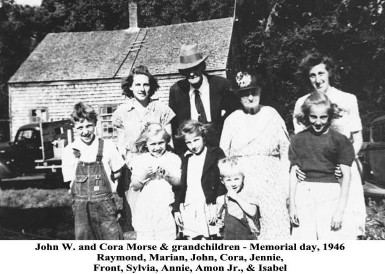
|
|
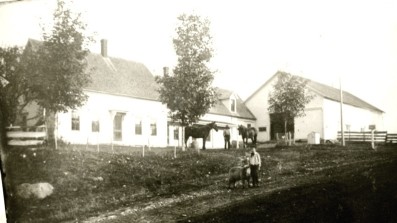
|
| Home
of Charles & Cora (McFarland)
Vose - Knox, Maine |
Cora was surprised, even at herself, at
being able to tell the whole story to
Amon. She hadn’t even thought of some of
the details of that night long ago until
now. Amon never forgot the story,
telling it to his daughter, Isabel, in
his latter years.
Cora and Charlie had been members of the
Grange in Knox. She had many friends in
her adopted town, having lived there for
over seventy years of her life.
Cora married John W. Morse of Belmont in
1922. They lived on, for twenty-nine
years together, at the farm on the Morse
Road, formerly called the Hoxie Road.
John died there in 1951. He was buried
in East Searsmont in the Marriner
Cemetery with his first two wives, who
had died very young.
Cora proudly held the gold-headed cane,
having the distinction of being the
oldest resident in the Town of Knox.
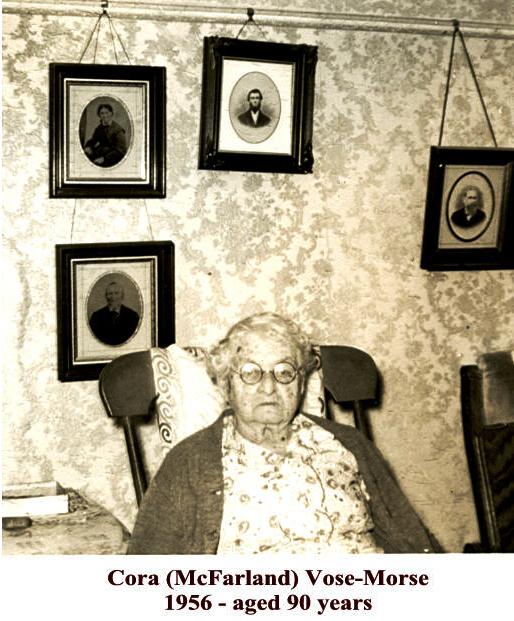
|
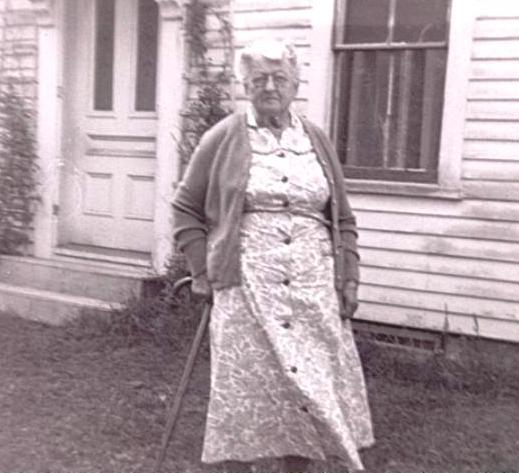
|
| Cora (McFarland)
Vose-Morse 1956 - Age 90 years |
Cora
died in Dec. 1960, aged ninety-four
years, having lived through some
terrifying events in her lifetime.
Amon’s wife, Mary, recorded that there
was a bad snow storm on the day of
Cora’s funeral. It was fitting that
there was a snow storm, as on the night
that her beloved Grampa and Gramma died,
protecting Cora and her baby sister.
Cora is buried with her beloved Charlie
in the Halldale Cemetery, where Grampa
and Gramma McFarland are also at peace
and rest.
|

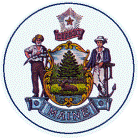
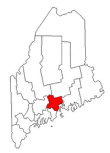
.jpg)


%20&%20John%20W%20Morse.jpg)

